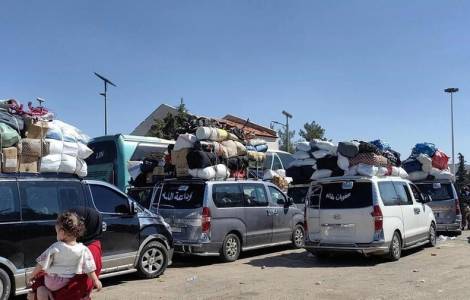
UNHCR
Beirut (Agenzia Fides) - The ongoing military escalation in Lebanon has developed into a "comprehensive aggression against various Lebanese regions, resulting in the martyrdom of thousands of citizens and the displacement of hundreds of thousands from southern Lebanon and the Bekaa
Valley. These are "crimes" that "show the disregard for the principles of international law, the rules of the Geneva Conventions and all conventions governing on armed conflicts". This is emphasized by the Middle East Council of Churches (MECC), based in Beirut, which in a statement released yesterday called on the international community to "intervene as soon as possible and issue a clear position condemning the war crimes against civilians by launching raids, and the systematic destruction of property and the interruption of food and health supplies."
In light of the tragic events in Lebanon, the Council held an emergency meeting of the General Secretariat chaired by the Secretary General, Lebanese Orthodox Christian Professor Michel Abs. Participants in the meeting prayed together for peace and discussed "urgent humanitarian issues and ways to support families." Without mentioning the Israeli army by name, the MECC in its communiqué "strongly condemns the killing of innocent people, children, women, the elderly, and other civilians, and deplores the attacks carried out by aggressor forces on densely populated areas that have led to the death of some 500 people in one day and the displacement of hundreds of thousands of citizens from their areas". The text also urges "the provision of international protection for civilians so that organizations and associations can supply them with the necessary materials for a decent life".
During the meeting, the participants also set up a working group to coordinate local initiatives to support families displaced from their areas.
"We all live in a situation where fear, pain, anger and anxiety are mixed," said Maronite priest Rouphael Zgheib, National Director of the Pontifical Mission Societies in Lebanon and professor at the Jesuit University "Saint Joseph", to Fides. "The uncertainty about what awaits us weighs on everything. It is not clear who can stop all this and whether the attacks are just the beginning." The Israeli army's bombings are directed against targets identified as possible bases of the Shiite Hezbollah Party. A strategy that has also been hitting small Shiite enclaves and villages in predominantly Christian areas for days. "This morning," Father Rouphael Zgheib told Fides, "the small Shiite village of Maaysra in the Keserwan area, a historical settlement area of Catholic communities, was bombed. It is a village just a few kilometers from the headquarters of the Maronite Patriarchate in Bkerké."
The bombings in central Lebanon are causing fear among the population. Mistrust and suspicion are also increasing after the deadly danger also came from pagers and walkie-talkies, making it dangerous to speak to or approach people belonging to the Shiite community and directly or indirectly linked to Hezbollah. "This uncertain situation," adds Father Zgheib, "is also affecting the relief efforts for the displaced and injured. Hospitals are collapsing, they were not prepared to treat the many people wounded in the face and eyes by pagers that became bombs." "Churches and schools are opening to welcome the displaced, and there are many individual initiatives of solidarity with Christians and Muslims fleeing the south and other affected areas," he affirms. "However, this spontaneous solidarity is accompanied by mistrust. The propaganda and political polarization of recent years have fueled distrust and triggered mutual attacks between the various parties, who accuse each other of betraying Lebanon and being a disaster for the country. The economic crisis has also limited the willingness to help those in need. This leads many to help only members of their own family network and confessional group," the priest concludes. (GV) (Agenzia Fides, 25/9/2024)